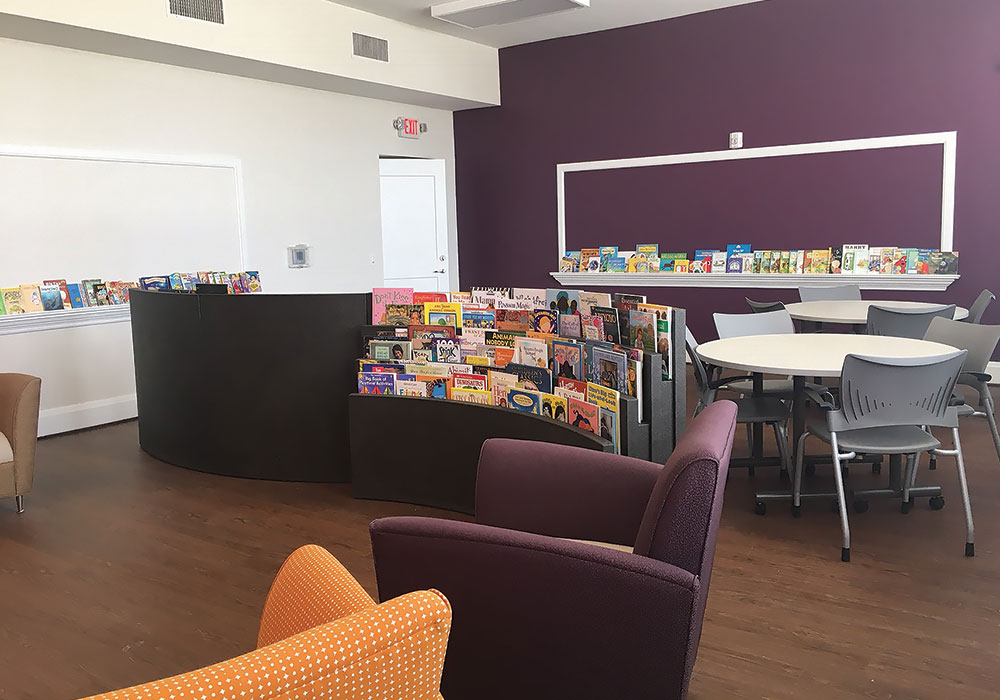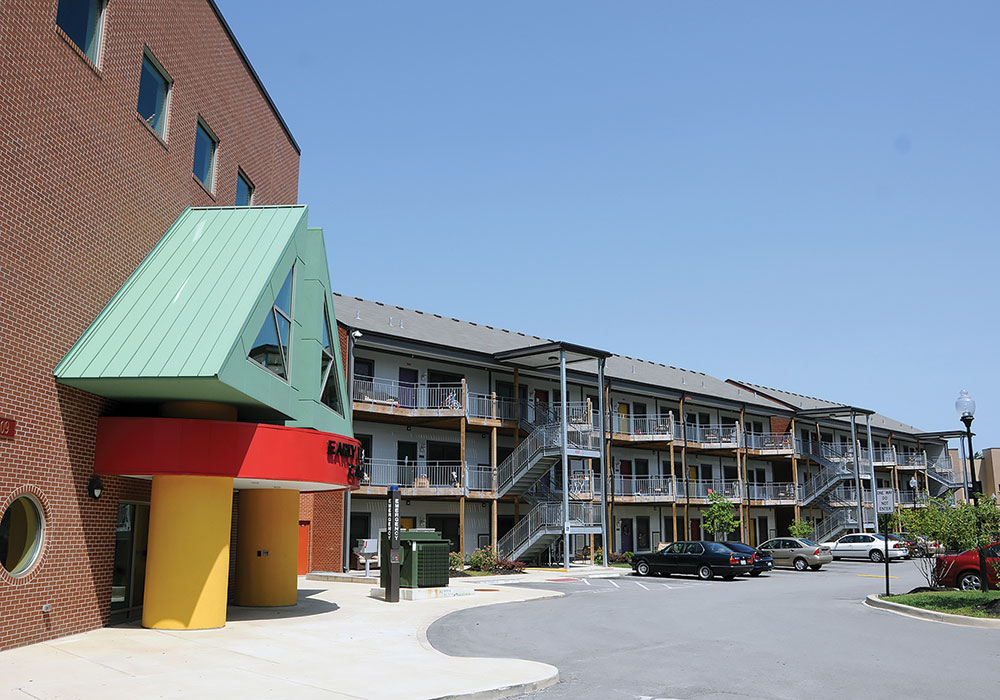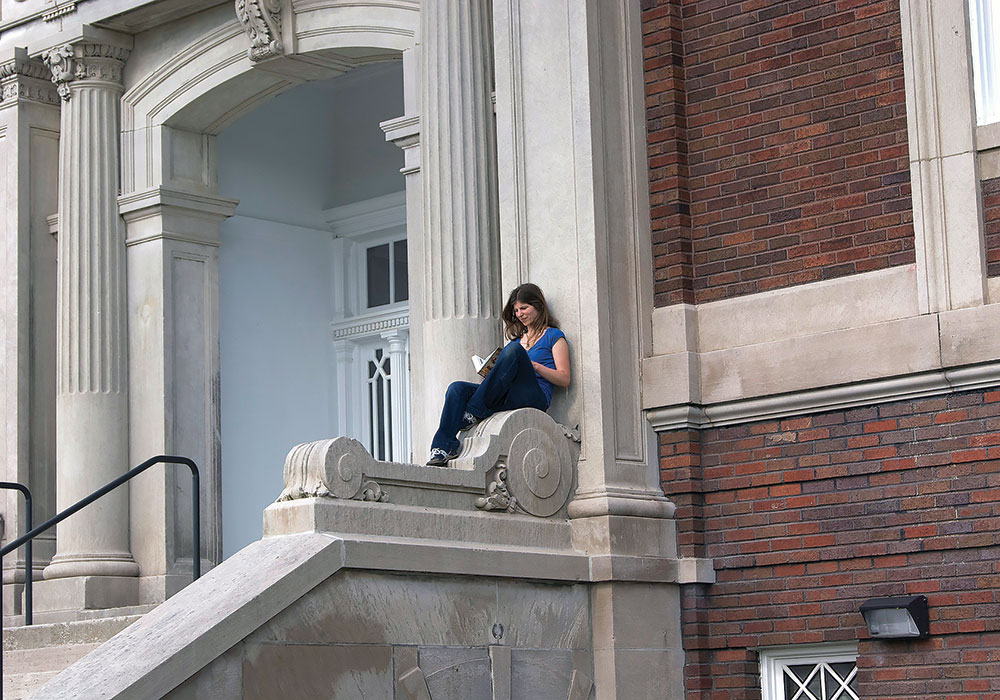Planning May 2019
HUD Secretary’s Opportunity & Empowerment Award
Empowerment in Louisville and Beyond
Family Scholar House: Transforming Families and Communities | Louisville and Covington, Kentucky

Watercolor of Parkland Scholar House. Painting by Adam Wisler.
By Anne Wyatt
In a state with the third highest poverty rate, the fifth severest teen birth rate, and a bachelor's degree attainment rate of 22 percent — 10 points below the U.S. average — service providers at Family Scholar House in Louisville, Kentucky, know there's no silver bullet for the cycle of poverty. Thus, for the last decade, the nonprofit has been hard at work leveraging local, state, and national partnerships to create a comprehensive program to solve the challenges faced by local low-income single-parent families and youth aging out of foster care and help them achieve self-sufficiency.
The FSH program has brought significant outcomes for participants, the larger Louisville community, and beyond. For these reasons, Family Scholar House was recently selected by APA and the U. S. Department of Housing and Urban Development to receive the 2019 HUD Secretary's Opportunity & Empowerment Award.
"[Family Scholar House] is the type of program HUD supports because it transforms people's lives," said HUD Secretary Ben Carson said during a 2018 visit to FSH in Louisville.

Children's Library and Family Study Center at Lincoln Grant Scholar House campus. Photo courtesy Family Scholar House.
Comprehensive approach
In addition to individually tailored, wraparound services that FSH offers to help residents build life skills and pursue post-secondary education, the program provides 324 affordable housing units across five multifamily developments, which are critical to its model.
"There are all sorts of ways to help people, but if they don't have stable, affordable housing, very few people can take advantage of programs and services that will improve their ability to provide for themselves and their families," says Cathe Dykstra, FSH's president and CEO.
From there, Dykstra and FSH take the well-worn saying about teaching people to fish and ramp it up tenfold with workshops and support programs ranging from family health and wellness to financial literacy, career training, and tax assistance.
Children's and intergenerational offerings include Toddler Book Club, Young Readers Club, Creative Expressive Art, Empowerment for Family Success, and Family Cafe, a weekly meal shared by FSH residents and community members to discuss current events.
Family Scholar House by the Numbers
585 families (with a total of 884 children) have lived in the Family Scholar House residential program.
788 families currently receiving support services in the pre-residential program.
99% participants who have exited the program to stable housing.
431 college degrees earned by participants.
40 participants who have purchased their own homes.
As of September 2018. Source: Family Scholar House
"Not only do I feel safe, and not have to worry about how to pay my next bill, but I get the chance to become a better parent to my son Liam and the best student I can be," says resident Madison Wolf, who sums up her FSH experience as an "opportunity to thrive."
Resident participation and accountability are built into the program, with requirements for a minimum 2.0 GPA, attendance at community meetings, volunteering, and civic engagement, which helps build a positive relationship with the surrounding community, often a significant challenge when developing low-income housing projects.
One of the ongoing goals is to prevent community members from equating "low income and low moral character," says Kimberly Stephenson, vice president of development at the Marian Group, the developer of FSH.
Neighbor buy-in has been possible with the project's focus on community benefit, including creation of community parks and involving residents and community members in events and volunteer opportunities. Through partnerships, exploring community needs and opportunities, and leveraging of resources, projects have become "community anchors," says Stephenson.

A proud single parent moving into FSH Riverport Landings. Photo courtesy Craig W. Davis Photography.

Early Learning Center at FSH in Louisville. Photo courtesy Family Scholar House.
Strong partnerships
FSH credits the project's success to partnerships and innovative thinking. Active engagement and cooperation between localities, HUD, and the Kentucky Housing Corporation have played a critical role in helping Family Scholar House overcome barriers to providing housing as a complement to its educational programming.
The Marian Group, a for-profit developer, partnered with FSH to build its five multifamily housing projects in Louisville and with the Northern Kentucky Community Action Commission on the Lincoln Grant affiliate in Covington, Kentucky.
Several of the developments include rehabilitation and adaptive reuse of historic structures. Three formerly vacant schools have been transformed into new hubs for educational endeavors — housing and facilities for students.
According to Marian, projects used multiple forms of financing, including the Low-Income Housing Tax Credit and a combination of layered soft funding resources like HUD's Home Investment Partnership Program, Community Development Block Grant, Housing Trust Fund, federal and state historic tax credits, nonprofits, private donors, lenders, equity partners, and community stakeholders.

A young woman reading on the grand staircase of Stoddard Johnston Scholar House. Photo courtesy Family Scholar House.

Green roof at the Gladys & Lewis "Sonny" Bass Louisville FSH campus. Photo courtesy Family Scholar House.
Far-reaching impacts
The FSH program packs positive outcomes for both participants and the larger Louisville community. FSH has expanded its services over the last decade and now serves 3,500 families annually, 585 of which participated in the residential program.
At present, 247 families and 32 foster alumni are in residence. Another 788 families are in the pre-residential program and are currently receiving academic advising, case management, peer support, and other services as they wait for housing to become available.
Program participants have shown high levels of success: 81 percent have gone on to stable employment; 65 percent continued their postsecondary education after leaving the program, many in graduate programs; and 92 percent of college credit hours attempted have been completed.
The flow of services and benefits has rippled through the local community as well: Construction and service jobs provide employment and economic benefit. Safely housed and healthy families tend to have lower costs for emergency services, and renovated historic structures provide community-serving facilities and places of pride in neighborhoods.
"Having important educational programming as delivered by Family Scholar House is vital to Louisville," says Mayor Greg Fischer. "My administration is happy to join in a commitment to affordable housing through an investment of over $41 million in the development of affordable housing since FY16."
Recognizing that need far outpaces availability, FSH is replicating its success through an affiliate program, created in 2012, that helps other communities implement similar programs. The first affiliate project, Lincoln Grant, opened in Covington, Kentucky, in 2016. Others are currently being planned in Kentucky and Indiana.
Family Scholar House and Marian Development
LOCATION: Louisville, Kentucky (five sites); Covington, Kentucky, satellite site
CHALLENGE: End the cycle of poverty among young single parents and youth aging out of foster care by helping them gain educational and personal living skills and ultimately achieve self-sufficiency.
IMPACT: Program participants' high levels of success: 81 percent now in stable employment, 65 percent continued their postsecondary education, 99 percent have found stable housing.
JURY COMMENTS: Program exhibits innovative civic engagement, partnership, and supportive services to students; measurable outcomes, including high level of participant educational and employment success; and a transferable and replicable model.
Resources
Learn more and watch the award video.
Anne Wyatt is a housing planner and frequent contributor to Planning.


